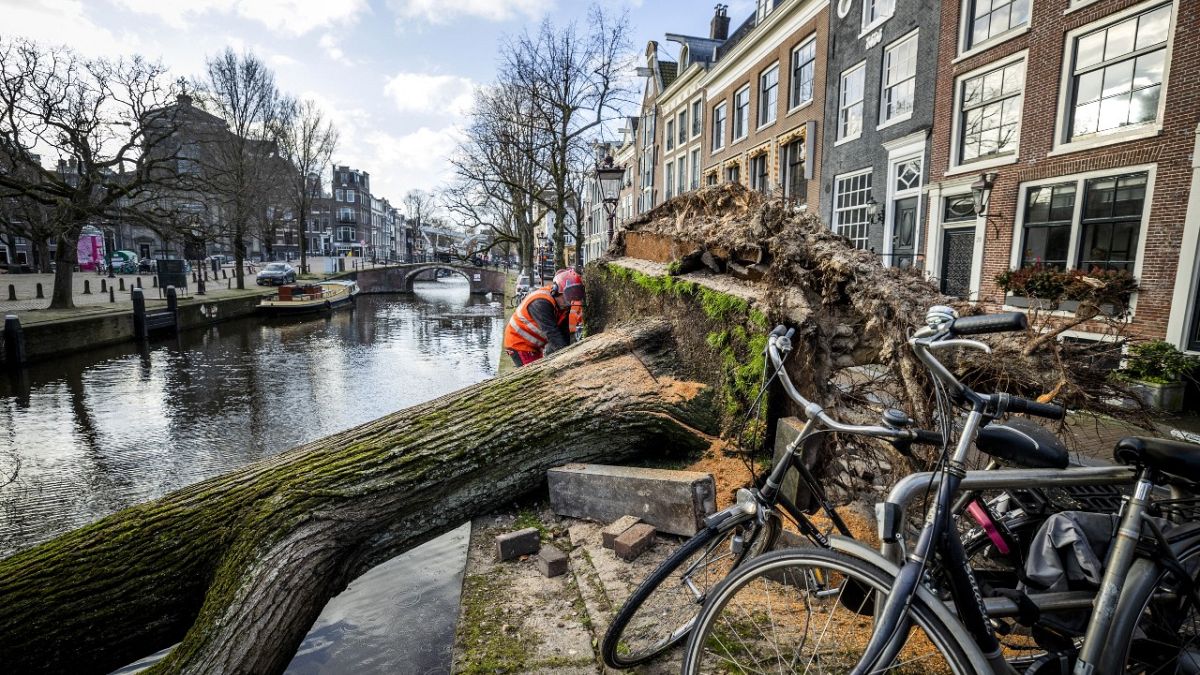After passing over the British Isles, Storm Eunice struck France, the Benelux countries, Denmark, Germany and Poland — uprooting trees, taking out power lines and disrupting rail services.
Much of northwestern Europe is counting the cost of Storm Eunice on Sunday, after it swept onto the continent from the British Isles, leaving death and destruction in its wake as well as massive power cuts.
On Saturday night 16 deaths had been blamed on Eunice: four in the Netherlands, four in Poland, three in England, two in Germany, two in Belgium, and one in Ireland. Many were caused by trees falling on vehicles.
After developing over Ireland, the storm passed on Friday over part of the United Kingdom then northern France and the Benelux countries, before continuing its route towards Denmark and Germany.
The storm struck a large part of northern Germany, where a state of red alert was declared before being lifted later.
More than 1,000 kilometres of railway lines were damaged, a spokesperson for Deutsche Bahn said, mainly caused by fallen trees.
Warning of storm force gusts of wind of over 100 kmh, German meteorological services earlier warned of damaged and said that people should avoid being outdoors.
Hundreds of flights, trains and ferries were cancelled across northwestern Europe as extreme winds from Eunice swept through less than 48 hours after Storm Dudley, which left at least six people dead in Poland and Germany.
According to police in the Belgian city of Ghent, a 37-year-old man succumbed to his injuries on Saturday after being struck on the head by a solar panel the previous day.
Some 1.2 million homes in Poland were without power on Saturday night, according to local authorities, and several rail links were suspended.
In The Hague, Netherlands dozens of houses were evacuated over fears the bell tower of a church could collapse. The Dutch rail network was disrupted, and the Thalys Amsterdam-Brussels connections was interrupted, with a resumption expected in the afternoon according to a spokesperson.
The gale force winds blew off part of the roof of the ADO Den Haag football stadium and sent roof debris flying.
In Belgium, according to Infrabel, most lines were in operation on Saturday after major nighttime repair work.
In the north of France, around thirty injuries were recorded, in road accidents linked to the wind, falls or because of falling materials. About 37,000 homes remained without power on Saturday morning and some regional rail links were interrupted.
Strong gusts of wind coupled with high tides raised fears of flooding, especially as heavy rains were expected.
Cross-Channel ferry traffic was interrupted, hundreds of flights cancelled on Friday, road and rail transport affected. Waves sometimes exceeding nine metres were recorded in the western Brittany region, while gusts of wind locally reached 176 kmh at Cape Gris-Nez in the north.
According to the British forecaster the Met Office, clearing operations in the UK were expected to be disrupted by a new gale, less strong nevertheless, expected in certain parts of the country. At least 226,000 homes remained without electricity by the middle of the day on Saturday.
An unprecedented gust of 196 kmh was recorded on the Isle of Wight, while others were measured at more than 110 kmh inland, including at London airport Heathrow.
The British Meteorological Service had issued a red alert level - the highest - over South Wales and southern England, including London. This is the first time that the British capital has reached this level of alert since the establishment of this system in 2011.
This piece has been corrected to reflect that The Hague is not the capital of the Netherlands.
